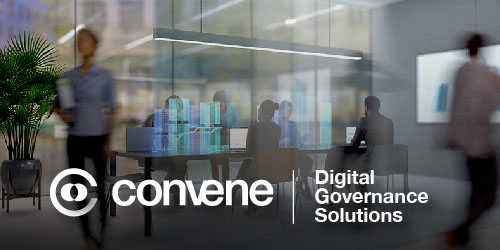Establishing an effective Board is one thing, but maintaining that effectiveness in the long-term is another factor altogether. Ineffective Boards can have disastrous consequences for an organisation, impacting the success and longevity of a company.
These times demand more from the Board. The last few years have been tumultuous and unpredictable, with the COVID-19 pandemic and cost of living crisis. This has hindered the Board’s ability to plan for the long-term.
But it is still important to focus on the future, even in the face of uncertainty. Convene is here to help demonstrate the ways your Board can effectively secure your organisation's long-term success.
1. Improve Board relations, communication and culture.
Making boards more resilient and effective means creating a cultural space where directors can scrutinise, challenge and debate. This requires the recruitment of a diverse Board, as well as getting the right Board structure and culture. When a Board and its members can work efficiently together, it increases their effectiveness in the long-term.
Board Members, now more than ever, are involved with strategy, technology, IT, cybersecurity and other issues. They are also spending more time with management than ever before.
The most effective Boards go beyond their duties in the meeting room. They encourage a close partnership with their senior management team to create forward-thinking objectives, set goals for performance, and strengthen responsibility through open communications. Nowadays, Boards depend on management to guarantee the implementation of their strategies, and they monitor progress to stay informed.
Creating a Board that combines Board culture and relations with its objectives for attaining long-term value, will lead to the formation of an effective executive team.
2. Appoint an effective Chair for your Board.
Another way to improve Board relations and effectiveness is by appointing a chair who can facilitate this.
Effective Board leadership makes an effective Board. Board meetings can be stressful, particularly in times of economic downturn or crisis, when the stakes are high. The Board chair plays a crucial role in ensuring meetings run smoothly, and achieve what they set out to achieve.
The chair must have a clear agenda that balances both strategic and fiduciary topics. They need to be able to encourage Board members to voice their opinions, and understand different perspectives while maintaining a clear vision of what needs to be done.
To enhance Board effectiveness, Boards need to be led by someone who can think of both the short-term and long-term goals of the Board, and consider this in all decision-making and discussion.
3. Implement, and then act on Board evaluations.
High-value Boards are now expected to do more than just provide strategic advice. They are now also required to actively work towards continuous improvement. These Boards must regularly evaluate their performance and make an effort to operate in a productive and effective manner.
A Board’s performance can vary over time and is dependent on many factors, such as Board composition, Chair leadership, and the life cycle of the organisation. It therefore needs consistent analysis.
Boards should conduct in-depth evaluation of their overall performance at least once per year, and add to this effort by holding regular feedback sessions after meetings.
Boards shouldn’t see this annual performance evaluation as a ‘box-ticking’ or ‘fill-out-the-template’ activity. Board evaluations need to facilitate a more thoughtful reflection of both individual and team performance, measuring this against specific goals.
High quality feedback, in both feedback sessions and overall evaluations , helps Boards and their directors recognise their areas for improvement.
A Board evaluation can be an extremely effective measure in determining whether a Board’s composition, structure and dynamics actually serve the organisation in both the short and long-term. The evaluation of the Board’s operations helps ensure it is running as effectively as possible, and maintaining longevity.
4. Invest in onboarding.
No matter a new Board member’s background or experience, it takes time to get used to an organisation’s strategy and culture. Especially with how Board operations can differ company to company.
Investing in thorough Board onboarding processes helps new Board members to establish themselves easily, so they can begin to make effective contributions and feel like a part of the Board.
Tailored onboarding practices towards both Board members and directors can help ensure all can participate in effective governance for the Board sooner, rather than later.
Effective Boards are those that take initiative, dedicate time to building relationships, and strive for constant improvement. By embracing these strategies, Boards can tap into their full potential and make a lasting impact on their organisation's ability to adapt and grow.
5. Factor in new and emerging trends.
Many Boards believe that they excel in providing value in conventional aspects like managing finances, monitoring risks, and enhancing productivity.
But as the last few years have taught us, Boards need to be not only capable in those sectors, but also be prepared to tackle emerging key issues such as cybersecurity and ESG.
To ensure Boards are successful in the long term they need to be not only sufficient in preparation, but also in analysing and adapting to surfacing trends. New risks in industries and sectors will require Board input, and it is crucial that Boards are prepared to not just continue on one course, but change for the future.
To create a lasting effect, it is crucial for the Board to readjust its usual priorities and consider new, long-term trends that contribute to value. These factors should be included in Board meeting agendas.
As the Board is primarily responsible for strategic supervision, Board members must possess adequate expertise in industry trends to effectively steer the company's long-term strategy.
6. Improve Board meetings and information sharing.
Boards need their meetings to run smoothly, and they need systems and software that facilitates this. Without access to relevant information easily, Boards cannot effectively administer their duties.
Board portals are a highly-secure, online, centralised hub that can help you do just that.
Board portals facilitate a secured environment for sharing confidential documents and information. It enables Boards to exercise good corporate governance and decision-making responsibilities despite working in remote workplaces.
Convene’s own Board portal software can help your leadership team to communicate effectively and ensure your long-term success.
Convene provides directors and administrators with the necessary communication and collaboration tools that simplify Board material preparation, reports, and Board document sharing, among many other meeting-related tasks.
From creating an agenda to establishing a strong admin trail, every step of the process should be as smooth as possible. With a Board portal like Convene at your side, you can instead focus on making your Board maintain its effectiveness in the long-term, without having to sweat the small stuff.
How Convene can help you Board
Convene’s Award Winning Board portal software allows your Board to communicate efficiently and run meetings with ease, maintaining an effective environment for your Board.
Convene now comes fully integrated with Microsoft Teams, ensuring that the meeting process is even more seamless for your organisation, and improving Board effectiveness.
Our Board portal features include:
- A Document Library, with role-based access to ensure your sensitive documents are protected.
- A built-in Audit Trail, so you can be sure you are compliant with all regulations.
- Integrated Video Conferencing, so you can make the switch from remote to hybrid working seamlessly, whilst still viewing your Board Pack all on one screen.
- Surveys, with the option for anonymity, so you can be sure you are aware of your employees' opinions.
- Action Items, so you can follow up on any tasks automatically.
- Accessibility Features, including text-to-voice, which makes us the leading accessible Board Portal.
- Fully GDPR-compliant security, including AES 256-bit encryption and ISO 27001 accreditation.
To discover how your Board can benefit from Convene, learn more about our software here, or book a free demo today.








